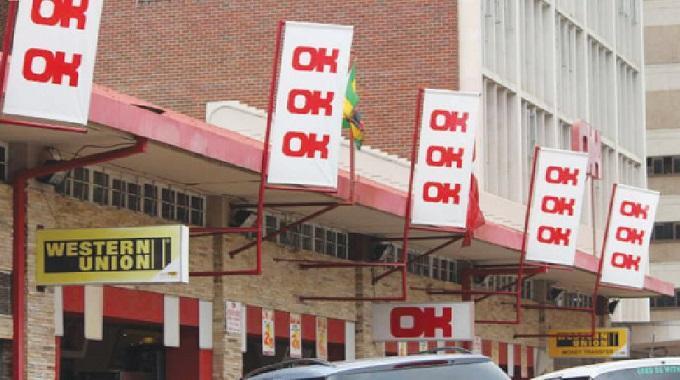News / National
OK Zimbabwe earmarks 50% of capital raise to clear debts
3 hrs ago | Views

Retail giant OK Zimbabwe Limited has announced plans to allocate more than half of the proceeds from its planned US$30.5 million capital raise - through a rights issue and property disposals - toward settling overdue debts and restoring operational stability.
According to internal company documents seen by this publication, OK Zimbabwe is seeking to reduce its current cost of debt, which stood at a steep US$3.1 million for the financial year ending March 31, 2025. Executives say this debt burden is unsustainable given the thin profit margins that define the country's competitive retail sector.
As of February 2025, the company's overdue creditor obligations exceeded US$30 million, with suppliers alone owed US$24 million. An additional US$5.2 million is owed to service providers - including for utilities, marketing, cleaning, and security - while statutory arrears total US$880,000.
To address these financial pressures, OK Zimbabwe plans to raise US$20 million via a renounceable rights offer to its existing shareholders. A further US$10.5 million is expected to be realised through the sale of select immovable properties, some of which are currently in use by the company. However, management has indicated that any such sales will proceed only if long-term lease-back agreements are secured.
"The rights issue and asset disposal programme aim to partially clear legacy debt, rebuild working capital, fund capital expenditure and, importantly, renew supplier confidence," the internal brief reads.
Properties earmarked for sale will be selected based on marketability and value potential, with a shortlist already drawn up. Among notable offers, the National Social Security Authority (NSSA) - a 19 percent shareholder in OK - has expressed interest in acquiring the OK Gweru and OK Malvern branches for US$4 million. This deal, however, hinges on satisfactory due diligence and the successful negotiation of a purchase agreement.
The company's financial and operational distress has been attributed to both internal and external challenges. Internally, OK Zimbabwe has struggled with poor capital allocation, delayed engagement with creditors, weak cash flow management, and slow adaptation to evolving market dynamics. Its expansion strategies have also suffered from inadequate execution.
Externally, the retailer continues to operate in a highly constrained environment, where informal retailers enjoy an advantage by bypassing strict regulatory frameworks, allowing for more flexible pricing and sourcing models.
In an effort to reverse its fortunes, OK Zimbabwe initiated a major executive overhaul in February. The move saw the exit of then-chief executive Maxen Karombo, chief financial officer Phillimon Mushosho, and supply chain director Knox Mupaya - who all left through voluntary separation agreements.
In response, the board brought back seasoned leadership to restore stability and rebuild trust with key stakeholders. Former long-serving chief executive Willard Zireva was reappointed in an interim capacity, while Alex Siyavora returned as chief financial officer and Muzvidzwa Chingaira was named supply chain director.
The company believes the capital raise, coupled with experienced leadership, will help re-establish a normal trading cycle, improve supplier relations, and put OK Zimbabwe back on a sustainable growth trajectory.
According to internal company documents seen by this publication, OK Zimbabwe is seeking to reduce its current cost of debt, which stood at a steep US$3.1 million for the financial year ending March 31, 2025. Executives say this debt burden is unsustainable given the thin profit margins that define the country's competitive retail sector.
As of February 2025, the company's overdue creditor obligations exceeded US$30 million, with suppliers alone owed US$24 million. An additional US$5.2 million is owed to service providers - including for utilities, marketing, cleaning, and security - while statutory arrears total US$880,000.
To address these financial pressures, OK Zimbabwe plans to raise US$20 million via a renounceable rights offer to its existing shareholders. A further US$10.5 million is expected to be realised through the sale of select immovable properties, some of which are currently in use by the company. However, management has indicated that any such sales will proceed only if long-term lease-back agreements are secured.
"The rights issue and asset disposal programme aim to partially clear legacy debt, rebuild working capital, fund capital expenditure and, importantly, renew supplier confidence," the internal brief reads.
The company's financial and operational distress has been attributed to both internal and external challenges. Internally, OK Zimbabwe has struggled with poor capital allocation, delayed engagement with creditors, weak cash flow management, and slow adaptation to evolving market dynamics. Its expansion strategies have also suffered from inadequate execution.
Externally, the retailer continues to operate in a highly constrained environment, where informal retailers enjoy an advantage by bypassing strict regulatory frameworks, allowing for more flexible pricing and sourcing models.
In an effort to reverse its fortunes, OK Zimbabwe initiated a major executive overhaul in February. The move saw the exit of then-chief executive Maxen Karombo, chief financial officer Phillimon Mushosho, and supply chain director Knox Mupaya - who all left through voluntary separation agreements.
In response, the board brought back seasoned leadership to restore stability and rebuild trust with key stakeholders. Former long-serving chief executive Willard Zireva was reappointed in an interim capacity, while Alex Siyavora returned as chief financial officer and Muzvidzwa Chingaira was named supply chain director.
The company believes the capital raise, coupled with experienced leadership, will help re-establish a normal trading cycle, improve supplier relations, and put OK Zimbabwe back on a sustainable growth trajectory.
Source - The Herald














































